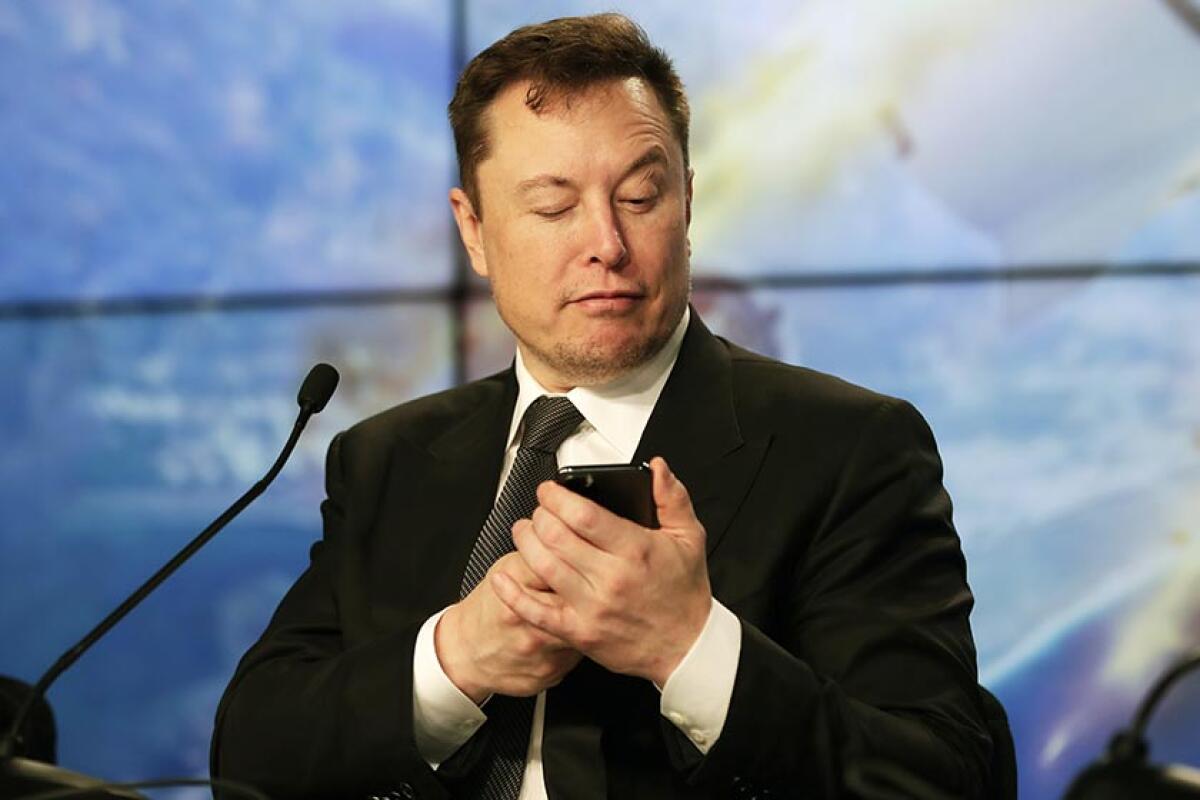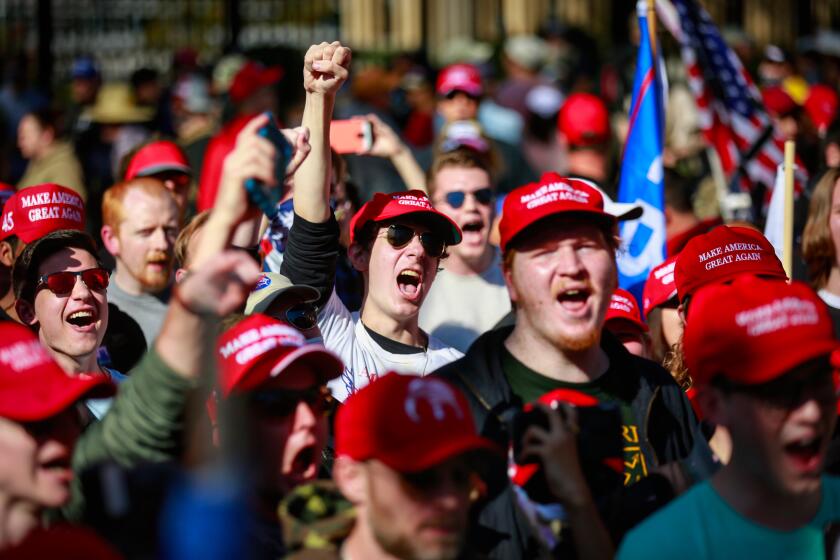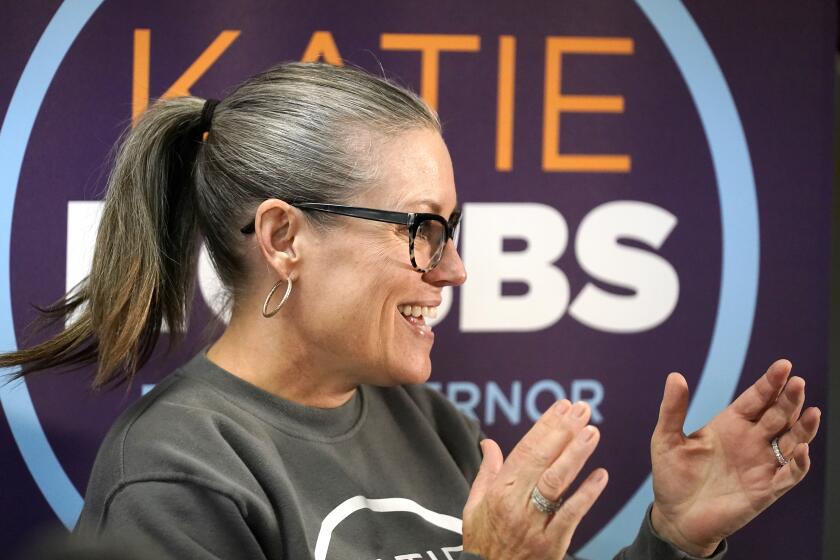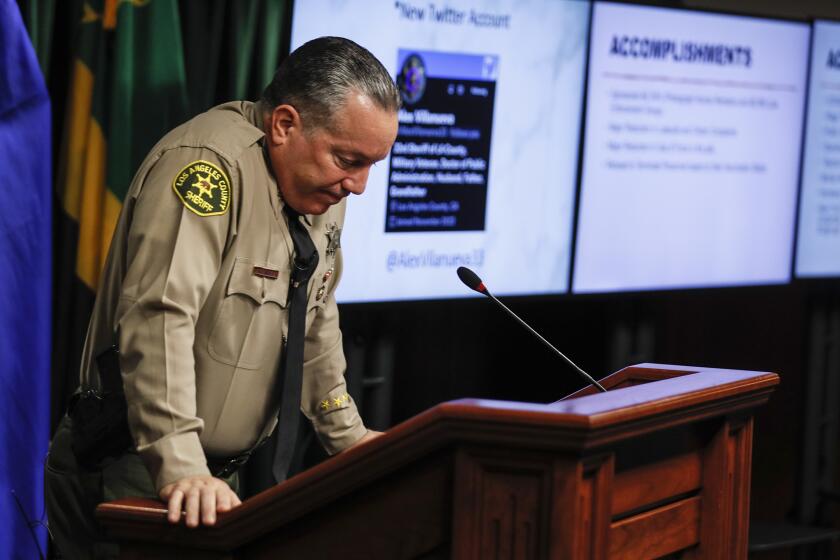Column: Elon Musk is breaking his new toy. Will it cost us our democracy?

It’s been less than a month, but how tired are we already of hearing about Elon Musk and Twitter?
If only Hooter’s had been for sale. But here we are, and the world’s richest man seems intent on throwing gasoline on the hate, lies and propaganda that already plagued the world’s most powerful method of communication.
All this is happening during a volatile election when we expect far-right vote fraud conspiracy theorists, Christian nationalists and a troubling contingent of American fascists to dispute reliable results in a continuing bid to undermine our legitimate government.
Which means, for those who care about fair elections, democracy and protecting vulnerable groups from attack, that we have to pay attention to what is happening at Twitter whether we like it or not.
Over a weekend of chaos, Musk changed the rules to ban accounts that mocked him. He continued to push his plan to sell the blue check marks that mean an account has been verified as authentic and trustworthy to anyone who is willing to pay $8 a month. This is especially concerning for the coming weeks when election information and deceits will be pushed on the platform and one powerful way of telling them apart will be gone.
Doubling down on that dubious proposal, he made claims that truth and facts could be crowdsourced by his new blue-check wielding mobs (if 80% of Twitter believes reptile aliens have taken over the bodies of Democrats, it’s true?) and attacked journalism.
Monday at the social media giant started off with the real Musk counseling people to vote for Republican candidates.
Right before that, he posted a picture of a Nazi soldier.
So that’s how things are going at Twitter.
“Icarus has crashed,” is how Brian Levin, director of the Center for the Study of Hate and Extremism at Cal State San Bernardino, explained it.
Now the whole joint’s on fire because “Elon Musk has inserted himself as a provocateur at a time when we need a philosopher,” he said.
We are a captive audience of Musk until we understand where he’s headed. Simply opting out or ignoring his influence on our larger society leaves too much power in the hands of one man who is showing us that, at best, he finds inflicting pain and worry to be funny.
Musk, of course, can tweet whatever he wants. He has the same free speech rights as the rest of us.
But it’s troubling to see him tweeting Nazi imagery in this moment of extreme unpredictability that has seen real-world violence flare repeatedly from online lies. As a chief executive with 114 million followers, he’s someone who shouldn’t be mocking common decency and facts.
Instead, he should be leading by example to give us confidence that the company he runs will be managed ethically, and that, in the coming election, we can trust false information will be removed to protect our democracy.
As Maya Angelou famously said, “When people show you who they are, believe them the first time.”
Like maybe that time last week when Musk tweeted a link to an ugly and debunked conspiracy theory about the attack on Paul Pelosi, then deleted it as if it never happened?
Let’s be real: Posting a photo of a Nazi soldier has meaning, even if the tweet purports to be about something else. Musk said he was commenting on the homing pigeons the soldier carried, comparing them to the “bird” that is Twitter. But I Googled it, and there are plenty of pigeon pictures that don’t contain Nazis.
“For free speech absolutists, Nazi imagery has become some kind of perverted litmus test,” Levin, whose father was a prisoner of war in Nazi Germany, told me.
But it’s a flawed one, especially at a moment when hate crimes against Jewish people are skyrocketing. Levin’s research has shown that antisemitic hate crimes jumped 59% from 2020 to 2021 and are continuing to rise this year. Same for hate crimes against LGBTQ folks, Asians, Hindus and virtually every other group that the far right can find a reason to villainize.
“This is not the time for him to push boundaries but rather for him to establish them, and that is where I fault him,” said Levin, pointing out that Musk, who essentially started the modern electric car revolution, is smart enough to understand the subtexts of what he’s doing. That makes his recent moves with Twitter all the more confounding.
“The ability to invoke Nazi imagery in the abstract to try to make a political, philosophical or humorous point stands in the face of that regime being the iconic example of evil in civilization,” Levin said.
Beginning Tuesday, when election results come in, we can be sure of nothing that comes from Twitter — not even that its leader cares to curb the worst of it, despite his protestations to advertisers.
We can’t and shouldn’t have faith in where information on Twitter is really coming from. We won’t know what the intent of the information is, or whether Twitter will be up to the task of monitoring its platform with half of the staff fired (though it’s been reported that only 15% of the staff monitoring misinformation was let go). We do know already that a flood of election-denying plots is likely.
It is going to be even more chaotic than it is now, and that anarchy will be made worse by bad actors seeking to capitalize on it. And before you hit me with how an $8 subscription fee is going to trample the bots and conspiracy purveyors, honey, please. Do you think China won’t pay eight bucks for a chance to topple U.S. power?
“You don’t need to have a lot of provocateurs to be able to do something that is dangerous,” Rick Hasen, a professor of law at UCLA and director of the Safeguarding Democracy Project, told me. “That amount of money is not a lot of money as far as political speech goes.”
Hasen offered this bit of hope. To him, the whole mess sounds “like somebody with a bruised ego more than someone with a secret far-right agenda.”
Alexander Reid Ross, an extremism expert at Portland State University, had a similar read on Musk.
“It seems like Elon Musk is sort of outdoing himself in a sense that is rather unfortunate,” Reid Ross said. “Instead of trying to be a role model, he is sort of stooping to a lowest common denominator. Maybe that’s just him.”
Maybe it is, which would be better than having a far-right antidemocratic agenda.
Musk also tweeted Monday, “What do you call someone who is a master of baiting,” apparently in sophomoric reply to a now-deleted tweet. I don’t know what he was responding to, but it seems a little too spot on, since Musk seems to be taking great pleasure in this turmoil.
I would call a relentless master baiter tiresome and immature, and hope they didn’t have the power to subvert my democracy.
More to Read
Sign up for Essential California
The most important California stories and recommendations in your inbox every morning.
You may occasionally receive promotional content from the Los Angeles Times.










